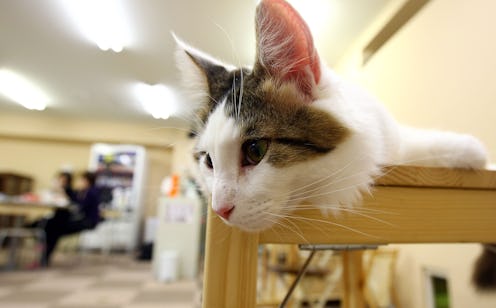Life
Does Your Cat Have OCD?

As Bustle's resident amateur psychologist, this recent New York Times headline certainly grabbed my attention: "Does That Cat Have OCD?" The essay introduces us to the fascinating studies of Dr. Laurel Braitman, a historian of science who became interested in animal minds following her distressing experiences with a troubled adopted dog, whose anguish apparently led him to self-harm. She's written a book, Animal Madness, about her findings regarding animal psychology: What they can tell us about our furry friends, and what they can tell us about ourselves.
Like Braitman, I first thought long and hard about the inner lives of animals as a result of having adopted a crazy dog. Here we are, on the day I adopted Chip in March of 2009, when my hair sucked and before I realized he was nuts:
In the first months of our life together, Chip ripped up the carpet by my door, rubbed the skin off his nose trying to escape his crate, salivated in distress so excessively it gave him a rash on his stomach, and howled to the extent I feared I'd be evicted. The poor dog was suffering from full-blown separation anxiety, and his discomfort clearly rose to the level of actual panic attacks (which I had had the misfortune of experiencing myself). As we worked together to resolve his issues through training exercises, I gained new appreciation for the animals in my life.
On the other hand, it can't possibly be the case that your twitchy cat or obsessively burrowing hamster is literally having the same experiences as a human with OCD. As I explained recently in my revealing OCD tell-all, part of what makes OCD thoughts so utterly upsetting is their bizarre content, but animals don't self-judge whether their thoughts are appropriate. Although higher animals are probably capable of having some abstract thoughts like these, there isn't any reason to believe that they can think through hypothetical situations in the way that produces profound anxiety in human OCD patients.
Also, animals have different interests: Animals don't care much about being clean, so they don't have contamination worries. They don't research things like nutrition or health online, so they can't become cyberchondriacs. They don't worry about emotional baggage from their parents, the baggage they're giving their children, their moral obligations, or their long-term futures. These characteristics limit the scope and causes of mental problems for animals.
But even if animal mental illness isn't identical to human mental illness, it can still be helped. Regardless of the content of the thoughts lurking in troubled animals' minds, there is plenty of reason to believe that the emotional states of animals are sincerely and sometimes strongly felt. If your bird is plucking its feathers, you can bet it's feeling anxious. And if your cat or dog has stopped playing, you can bet it's feeling sad.
Your first stop should be to the vet, to make sure that the emotional problem doesn't have an underlying physical cause, like untreated chronic pain. Then consider making an appointment or two with an animal behaviorist. It's not cheap, but the behaviorist can help you to understand how you may have accidentally encouraged your pet's maladaptive feelings and how you can help him or her to learn new behaviors and responses.